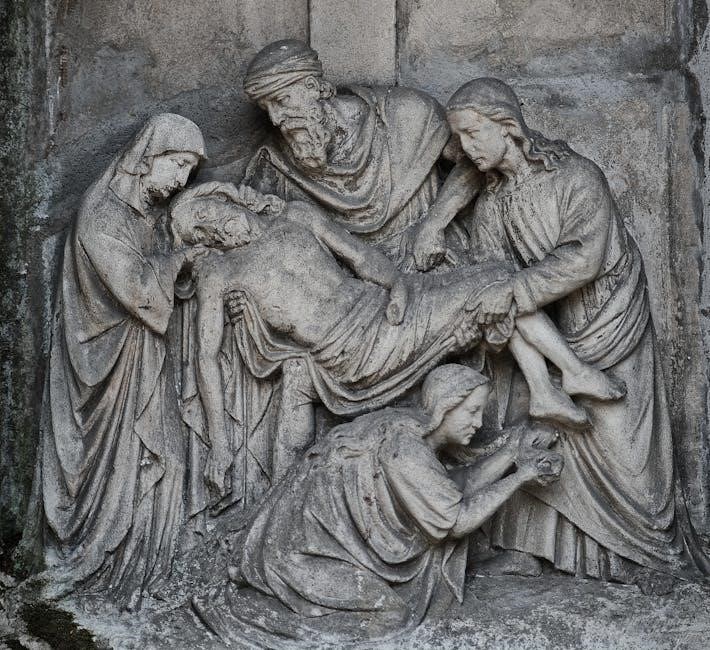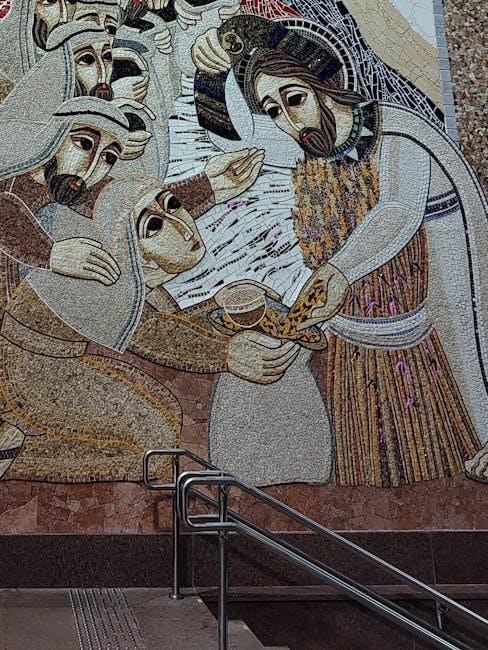The Acts of the Apostles, authored by Luke, chronicles the early Christian church’s growth and the apostles’ missionary journeys, with PDF resources aiding in-depth study․
1․1 Overview of the Book
The Acts of the Apostles serves as a historical bridge between the life of Jesus and the spread of Christianity․ It narrates the early church’s formation, the apostles’ missionary journeys, and key events like Pentecost․ The book transitions from Jerusalem’s central role to the expansion of Christianity across the Roman Empire, emphasizing Peter and Paul’s pivotal roles․ Its narrative style provides insights into the challenges and triumphs of the early believers, highlighting the Gospel’s universal message․
1․2 Authorship and Historical Context
The Acts of the Apostles is traditionally attributed to Luke, the same author as the Gospel of Luke, and addresses Theophilus, a prominent figure․ Luke, a companion of Paul, provides a detailed account of the early church’s expansion from Jerusalem to Rome․ The book spans 33-63 AD, covering pivotal events like the Ascension, Pentecost, and Paul’s missionary journeys․ It bridges the life of Jesus with the spread of Christianity, emphasizing the Holy Spirit’s role in empowering believers and the universal scope of the Gospel message․
1․3 Significance in the New Testament
The Acts of the Apostles is crucial as it connects the life of Jesus with the early church’s development, detailing the Holy Spirit’s empowerment and the church’s expansion․ It provides historical context for the spread of Christianity, showing how the apostles, especially Peter and Paul, propagated the faith․ Acts also highlights key theological themes like unity, persecution, and missionary work, serving as a foundational text for understanding the New Testament church’s beliefs and practices, available in PDF formats for study and reflection today․

Historical Background of the Acts of the Apostles
Acts, spanning 33-63 AD, details the early church’s rise, key events like Pentecost, and the spread of Christianity․ Written by Luke, it links Jesus’ life to the church’s growth, providing historical context for the apostles’ missionary work and the transition from Jewish to Gentile inclusion, as seen in PDF resources available for study․
2․1 The Timeframe: 33-63 AD
The Acts of the Apostles covers the period from 33 AD, following Jesus’ ascension, to around 63 AD, ending with Paul’s imprisonment in Rome․ This era saw the establishment of the early church in Jerusalem, the outpouring of the Holy Spirit at Pentecost, and the missionary journeys of Peter and Paul, marking the spread of Christianity beyond Judea․ The timeframe highlights the transition from a Jewish sect to a universal faith, with PDF resources offering detailed insights into this formative period․

2․2 Key Events: Ascension, Pentecost, and the Spread of Christianity
The Acts of the Apostles details pivotal events: Jesus’ ascension, the Holy Spirit’s descent at Pentecost, and Christianity’s expansion․ Ascension marked the end of Jesus’ earthly ministry․ Pentecost empowered believers, sparking rapid growth․ The early church’s unity and witness led to persecution, scattering believers who spread the gospel․ PDF downloads highlight these events, revealing how they shaped the church’s mission and global outreach, as documented in the New Testament․

Structure and Content of the Acts of the Apostles
The Acts of the Apostles is structured to show the church’s growth, from Jerusalem’s early community to global missionary efforts, with a focus on Peter and Paul’s roles․
3․1 The Early Church in Jerusalem
The early church in Jerusalem, led by the apostles, was a unified community centered on prayer and fellowship․ After the Holy Spirit descended at Pentecost, thousands believed Peter’s sermon․
- The believers shared resources, creating a communal life of support and equality․
- The apostles performed miracles, reinforcing their authority and spreading faith․
- Despite persecution, the church grew rapidly, establishing a foundation for Christianity․
This period, documented in Acts 2-5, highlights unity, spiritual power, and the church’s resilience․
3․2 The Missionary Journeys of the Apostles
The apostles’ missionary journeys marked the spread of Christianity beyond Jerusalem․ Philip preached in Samaria, while Peter reached Gentiles in Caesarea․ Paul, after his conversion, embarked on three extensive journeys, establishing churches across Asia Minor, Greece, and Rome․ These journeys, documented in Acts 8-28, highlight the apostles’ courage, adaptability, and divine guidance, transforming the early church into a global movement․
- Philip’s ministry in Samaria and the Ethiopian eunuch exemplified cross-cultural outreach․
- Peter’s vision in Joppa opened the door to Gentile inclusion in the church․
- Paul’s journeys, despite persecution, expanded Christianity’s geographic and cultural reach․
3․3 The Role of Paul in the Spread of Christianity
Paul, once a persecutor of Christians, became a pivotal figure after his conversion on the Damascus Road․ His three missionary journeys, chronicled in Acts 13-28, established churches across the Mediterranean․ Paul’s letters to these communities, such as Romans and Corinthians, remain foundational to Christian theology․ His efforts to unify Jewish and Gentile believers and his willingness to endure hardships for the Gospel exemplify his transformative role in spreading Christianity․
- Paul’s missionary journeys spanned Asia Minor, Greece, and Rome․
- His epistles addressed theological and practical issues in early churches․
- Paul’s advocacy for Gentile inclusion reshaped the early church’s identity․

Key Events in the Acts of the Apostles
The Acts of the Apostles details pivotal events like the Holy Spirit’s descent, Peter’s sermon, Stephen’s martyrdom, and Paul’s conversion, shaping early Christianity’s trajectory․
4․1 The Descent of the Holy Spirit at Pentecost
The Descent of the Holy Spirit at Pentecost, as recorded in Acts 2, marks a pivotal moment in Christian history․ This event empowered the disciples to preach boldly, uniting believers and launching the church’s mission․ PDF resources, such as the RSVCE and New Jerusalem Bible, provide detailed accounts of this miracle, enabling deeper study of its theological significance and the transformative impact on the early Christian community․
4․2 Peter’s Sermon and the Conversion of Thousands
Following the Holy Spirit’s descent at Pentecost, Peter delivered a powerful sermon to the assembled crowd, explaining the fulfillment of Joel’s prophecy and the resurrection of Jesus․ His message, filled with conviction and grace, led to the conversion of thousands, marking a significant expansion of the early church․ PDF versions of Acts, such as the RSVCE and New Jerusalem Bible, detail this pivotal moment, highlighting Peter’s role in spreading the Gospel and the immediate impact of his words on the burgeoning Christian community․
4․3 The Martyrdom of Stephen and Its Impact
Stephen, a devout deacon in the early church, was falsely accused of blasphemy and stoned to death․ His martyrdom, recounted in Acts, showcased his unwavering faith and forgiveness, as he prayed for his persecutors․ This event marked a turning point, intensifying persecution against Christians and prompting the dispersion of believers, which inadvertently spread the Gospel further․ PDF resources like the RSVCE and New Jerusalem Bible provide detailed accounts of Stephen’s courage and its profound impact on the early church’s growth and mission․
4․4 The Conversion of Saul (Paul) on the Road to Damascus
Saul, a zealous persecutor of Christians, encountered a vision of Jesus while traveling to Damascus․ This transformative event led to his blindness, recovery through Ananias, and devotion to spreading Christianity․ His conversion, detailed in Acts, reshaped his mission and identity, making him a key figure in spreading the Gospel․ PDF resources like the RSVCE and New Jerusalem Bible provide comprehensive accounts of this pivotal moment in Christian history․
Theological Themes in the Acts of the Apostles
The Acts of the Apostles highlights the Holy Spirit’s empowerment, the universal mission of the Church, and the unity of believers amidst persecution, reflecting early Christianity’s resilience and faith․
5․1 The Role of the Holy Spirit
The Holy Spirit is central to the Acts of the Apostles, beginning with the empowerment of the disciples at Pentecost․ This event marked the fulfillment of Jesus’ promise, enabling believers to preach boldly and unite the early church․ The Spirit guided the apostles, including Peter and Paul, in their missionary journeys, providing courage and wisdom․ Through miraculous interventions and conversions, the Holy Spirit demonstrated God’s presence and power, driving the expansion of Christianity and sustaining believers amidst persecution and challenges․
5․2 Missionary Work and the Expansion of the Church
Missionary work is a central theme in the Acts of the Apostles, highlighting the apostles’ efforts to spread Christianity beyond Jerusalem․ Peter’s ministry among Jews and Gentiles, followed by Paul’s extensive journeys across Asia Minor and Europe, demonstrate the church’s rapid expansion․ The Holy Spirit’s guidance and miraculous events facilitated this growth, emphasizing unity among believers and the universal call to faith․ These missionary endeavors, documented in PDF resources like the RSVCE and New Jerusalem Bible, illustrate the early church’s commitment to fulfilling Christ’s Great Commission․
5․3 Unity and Persecution in the Early Church
The early church in Acts exhibits remarkable unity despite facing intense persecution․ Believers shared resources, ensuring no one was in need, and stood firm in their faith amid trials․ Persecution, such as Stephen’s martyrdom and Saul’s conversion, became catalysts for the church’s growth․ PDF commentaries and studies highlight how unity amidst adversity strengthened the church, mirroring Christ’s teachings and setting a model for modern believers facing challenges․ This resilience remains a testament to the power of faith and community․

Manuscript Evidence and Translations
The RSVCE and New Jerusalem Bible provide authoritative translations of Acts, with PDF downloads offering study notes and historical manuscript fragments for deeper analysis and reflection․
6․1 The Revised Standard Version Catholic Edition (RSVCE)
The RSVCE of Acts of the Apostles offers a faithful translation, maintaining the original Greek text’s integrity․ PDF downloads are widely available, featuring notes and cross-references, enhancing study and reflection for scholars and general readers alike․ This edition is particularly valued for its clarity and theological accuracy, making it a trusted resource for understanding the early Christian church’s history and mission․
6․2 The New Jerusalem Bible Translation
The New Jerusalem Bible (NJB) translation of Acts of the Apostles is renowned for its clarity and theological depth․ PDF downloads of the NJB include all 28 chapters, offering a comprehensive study resource․ The translation is noted for its accessible language and rich commentary, making it ideal for both scholarly and personal study․ Its structured format, with added notes areas, enhances learning and reflection, catering to classrooms, homeschooling, and individual exploration of the early Christian church’s history and mission․
6․3 Availability of PDF Downloads and Study Resources
PDF downloads of the Acts of the Apostles are widely available, offering convenient access to the text․ Resources include the Revised Standard Version Catholic Edition (RSVCE) and the New Jerusalem Bible, both providing comprehensive study materials․ Many PDFs feature note-taking areas, making them ideal for classrooms, homeschooling, and personal study․ These downloadable files are accessible through various platforms, ensuring ease of use for scholars, students, and enthusiasts seeking to explore the early Christian church’s history and missionary expansion․
Modern Interpretations and Commentaries
Modern scholars and theologians offer insightful commentaries on the Acts of the Apostles, exploring its historical and theological significance․ Resources like podcasts and audio discussions provide accessible interpretations, while scholarly works by authors such as Adolf Harnack and G․ Campbell Morgan delve into deeper analyses, enriching understanding of the text for contemporary readers․
7․1 Scholarly Works on the Acts of the Apostles
Scholarly works, such as Adolf Harnack’s The Acts of the Apostles and G․ Campbell Morgan’s analyses, provide deep insights into the historical and theological dimensions of the text․ These works, available in PDF formats, explore the missionary journeys, the role of the Holy Spirit, and the early church’s growth․ They offer detailed exegesis and contextual understanding, making them invaluable for both academic and personal study of the Acts of the Apostles․

7․2 Podcasts and Audio Resources for Study
Podcasts like The Great Books with John J․ Miller and Jeff Cavins offer insightful discussions on the Acts of the Apostles․ These audio resources delve into key events like Pentecost and the missionary journeys, complementing PDF downloads․ Listeners gain a deeper understanding of the text’s historical and theological significance․ Such podcasts are ideal for those seeking to enhance their study of Acts, providing accessible and engaging commentary for modern learners․
The Acts of the Apostles remains a vital text, offering insights into the early church’s growth and missionary efforts․ PDF resources and study materials enhance its relevance for modern reflection and learning․
8․1 The Enduring Relevance of the Acts of the Apostles
The Acts of the Apostles remains a cornerstone of Christian study, bridging the Gospels and the Epistles․ It captures the Spirit’s empowerment, the church’s growth, and the apostles’ missionary endeavors․ PDF resources, including the RSVCE and New Jerusalem Bible, offer accessible study tools, enabling deeper engagement with this foundational text․ Its themes of faith, perseverance, and mission continue to inspire believers, making it a timeless guide for spiritual growth and reflection in modern times․
8․2 Encouragement to Study and Reflect on the Text
Studying the Acts of the Apostles offers profound insights into the early church’s challenges and triumphs, providing a blueprint for modern discipleship․ Available PDF resources, such as the RSVCE and the New Jerusalem Bible, make it accessible for personal or group study․ Reflecting on the text fosters spiritual growth, encouraging believers to embrace mission, unity, and faith; Engaging with this foundational text inspires a deeper connection to the roots of Christianity and its enduring relevance today․




